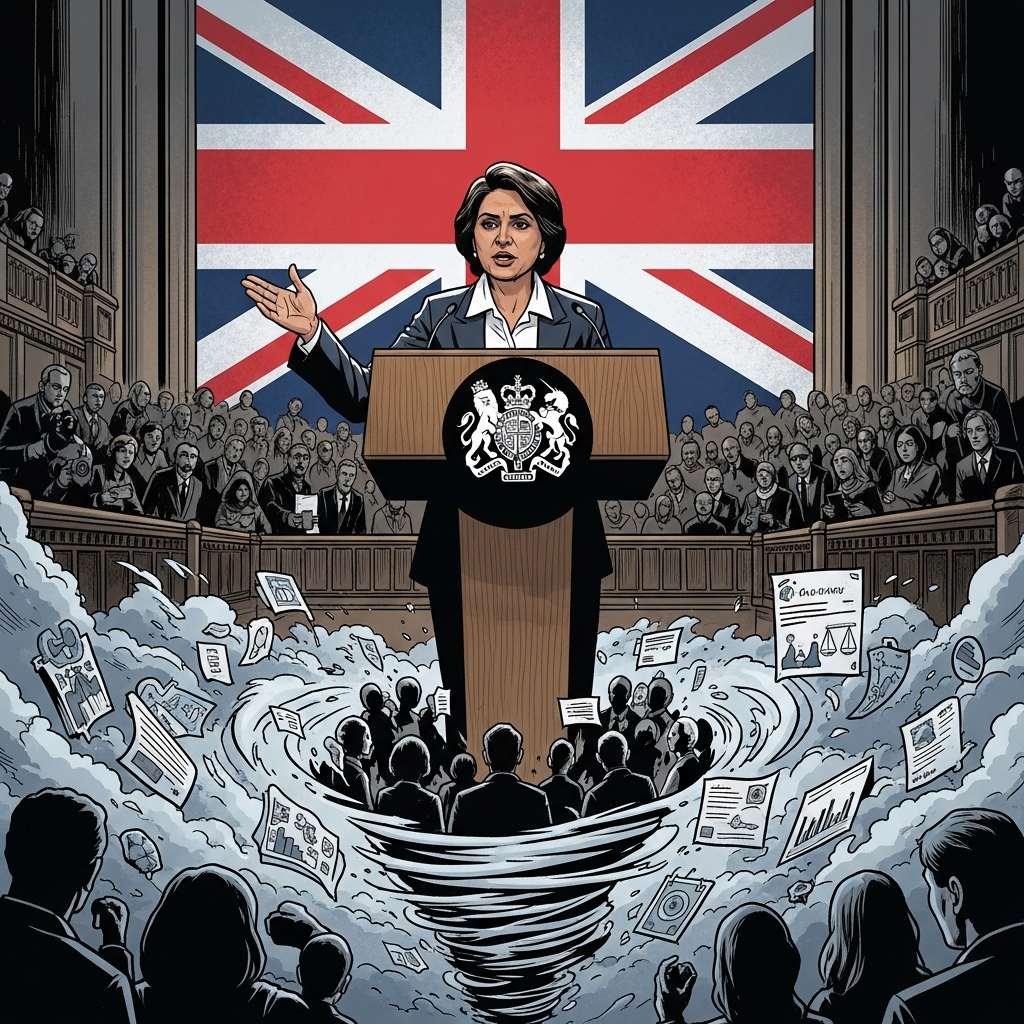The United Kingdom stands on the brink of its most significant shift in refugee and asylum policy in a generation. Home Secretary Shabana Mahmood is spearheading a sweeping reform package, aiming to fundamentally reshape how the UK manages migration. These proposals, set to be unveiled this week, have ignited intense debate within the Labour party and across the political spectrum. Mahmood has issued a stark warning to her fellow Labour MPs: “dark forces are stirring up anger” over migration, a sentiment she fears could turn dangerously against second-generation immigrants and severely fracture community relations.
This ambitious overhaul seeks to restore public trust in a system Mahmood describes as “out of control” and deeply divisive. However, its tough measures are already drawing significant criticism from human rights groups, charities, and even prominent Labour figures. The delicate balance between border control, public safety, and humanitarian obligations is now at the forefront of a crucial national conversation.
The Core of Labour’s Sweeping Asylum Reforms
Shabana Mahmood’s proposed legislation introduces a series of stringent changes designed to tighten the UK’s asylum system significantly. At the heart of these reforms is a re-evaluation of how refugee status is granted and maintained, alongside a more restrictive approach to legal appeals and family reunification. The Home Secretary believes these steps are essential to ensure the asylum system remains viable and prevents widespread public support for refugees from collapsing.
Redefining Refugee Status and Pathways
Under the new proposals, refugee status will no longer be permanent. Instead, it will be subject to reassessment every 30 months – approximately two and a half years. This means individuals and families, even those with young children settled in UK schools, could face return to their home countries if conditions there are deemed safe. Such constant review raises concerns about refugees being left in a state of “near-permanent limbo,” making it difficult to build stable lives, pursue careers, or fully integrate into British society.
Despite these tougher rules, Mahmood plans to introduce three “modest” new legal routes for refugees from war-torn nations like Sudan, Palestine, and Eritrea. These pathways would allow entry for students, individuals in specific professions, and those sponsored by community or voluntary organizations. However, refugees arriving via these new routes would not be granted permanent settled status, maintaining the temporary nature of their stay. Furthermore, individuals arriving in the UK through irregular means, such as small boats, could face a daunting 20-year wait before becoming eligible for permanent residency, a measure inspired by Denmark’s hardline approach.
Tightening Legal Avenues: ECHR, Appeals, and Claims
A central tenet of the Labour government’s plan involves a significant overhaul of how UK courts interpret and apply the European Convention on Human Rights (ECHR). Specifically, the focus is on Article 8, which protects the right to a family life, and Article 3, which prohibits torture and degrading treatment. Mahmood’s legislation aims to toughen how judges consider these provisions, rebalancing “public interest tests in favour of the British people’s expectations” and prioritizing “public safety” over family rights in deportation cases. This could lead to a substantial increase in deportations, even for individuals with immediate family members residing in the UK.
Other key measures designed to streamline the UK migration policy and prevent “gaming the system” include:
Restricting Appeals: Asylum seekers will be limited to a single appeal process, preventing multiple challenges on various grounds.
Fast-tracking Cases: A new dedicated body will be established to expedite cases involving dangerous criminals or those deemed to have little prospect of success.
Modern Slavery Claims: Legislation will be introduced to curb last-minute or “bogus” modern slavery claims, which officials believe are being abused.
Discretionary Support: The Home Office’s duty to provide support to asylum seekers will transition to a discretionary power, potentially allowing for the removal of individuals from accommodation.
- Age Verification: AI facial age estimation technology will be deployed to verify the age of individuals claiming to be children.
- www.theguardian.com
- www.theguardian.com
- www.inkl.com
Diplomatic Pressure and Enforcement
Beyond legislative changes, Mahmood has signaled a more aggressive stance on international cooperation. She recently threatened visa bans on Angola, Namibia, and the Democratic Republic of Congo. These countries have one month to begin cooperating on taking back individuals removed from the UK, or face a sliding scale of sanctions. This diplomatic pressure underscores the government’s commitment to enforcing its new removal policies.
Navigating the “Dark Forces”: Mahmood’s Rationale
Home Secretary Shabana Mahmood, herself a second-generation immigrant, frames these drastic changes as a necessary and urgent response to a “broken” asylum system. She argues that the current situation is “tearing our country apart” and that failure to act risks widespread public anger being exploited by “dark forces.” Mahmood believes this anger could easily turn on immigrant communities, including those who look like her, jeopardizing the social fabric of the UK.
Her article for The Guardian outlined her belief that “a country without secure borders is a less safe country for those who look like me.” She contends that by restoring “order and control” to the UK migration policy, the government can protect public support for genuine refugees. Mahmood envisions a “Greater Britain” that provides sanctuary to those in peril while maintaining secure borders, rejecting the idea of a “littler England.”
The Home Secretary’s strategy is reportedly inspired by Denmark’s system, known for its stricter rules on family reunions and temporary refugee status. This approach aims to demonstrate a firm hand on immigration, aiming to counter the growing influence of parties like Reform UK, which advocate for even more severe measures. Mahmood insists that while her proposals are tough, they are designed to work within the existing framework of the ECHR, rather than abandoning it entirely, a stance that differentiates Labour from the Conservatives and Reform UK.
The Growing Backlash: Concerns from Within and Beyond Labour
Despite Mahmood’s insistence on the necessity of these reforms, the proposals have triggered a wave of “significant unease” and condemnation. The harshness of the planned changes, particularly those affecting children and settled families, has provoked strong reactions from multiple quarters.
Internal Labour Division and Resignation Fears
Within Labour’s ranks, several senior aides and ministers are reportedly on “resignation watch,” expressing deep discomfort with the proposed crackdown. Particular concern revolves around the plans to ramp up deportations of refugee families, including those with children who have integrated into British schools and communities. Loyal MPs have voiced reservations about uprooting settled refugee families if their countries of origin are later deemed safe. Labour MP Tony Vaughan urged the government to “think again,” stating that deporting recognized refugees is “wrong” and that the accompanying rhetoric risks fostering divisiveness and racism. Stella Creasy, another Labour MP, criticized the creation of “perpetual limbo” for refugees, arguing it is both economically and morally damaging, hindering individuals from securing jobs, bank accounts, and mortgages.
Humanitarian and Economic Warnings
Charities and human rights organizations have been vocal in their opposition. The Refugee Council, for instance, warned that the constant review of refugee status and the potential for forced removals could lead to “another Windrush scandal.” Enver Solomon, CEO of the Refugee Council, highlighted the risk of children being “uprooted and forcibly removed” from their schools, potentially even being detained. Freedom from Torture head of asylum advocacy Sile Reynolds condemned the changes, stating they “will punish people who’ve already lost everything” and accused political parties of a “race to the bottom” in their treatment of vulnerable people. These groups emphasize that reducing human rights protections risks driving vulnerable asylum seekers underground, making them susceptible to exploitation. They reiterate that the UK’s legal system, rooted in post-WWII ECHR principles, can be “the difference between life and death for many.”
Political Crosscurrents: Conservative Reactions and Future Challenges
The political landscape surrounding Mahmood’s UK migration policy proposals is complex. While the Conservatives and Reform UK have advocated for even tougher measures, their reactions to Labour’s plan are nuanced. Shadow Home Secretary Chris Philp, a Conservative, dismissed Mahmood’s plans as “very small steps in the right direction with a few gimmicks.” He reiterated his party’s desire for “no illegal immigration whatsoever” and a firm cap on legal migration. Despite this criticism, the Conservatives have indicated they might support Mahmood’s plans should she face a significant rebellion from her own Labour backbenchers.
However, the legal challenges to Mahmood’s proposals are expected to be substantial. While she aims to legislate on the interpretation of the ECHR rather than withdrawing from it, human rights lawyers and advocacy groups are poised to challenge these changes in court. The debate highlights the ongoing tension between domestic policy objectives and international human rights obligations, a central theme in modern immigration discussions. The current context of record asylum applications, with 111,084 people applying in the year to June 2025, and nearly 40,000 Channel crossings by small boats so far this year, underscores the immense pressure driving these radical reforms.
Frequently Asked Questions
What are the key elements of Labour’s proposed UK asylum system overhaul?
Labour’s plan, led by Home Secretary Shabana Mahmood, introduces a stringent UK migration policy. Key measures include subjecting refugee status to review every 30 months, limiting asylum seekers to a single appeal, and toughening the application of human rights laws, particularly regarding family life (ECHR Article 8). The proposals also include fast-tracking cases for dangerous criminals, restricting modern slavery claims, and making Home Office support for asylum seekers discretionary. New, temporary legal routes will be created, but permanent settled status will be harder to achieve, especially for those arriving irregularly.
How do these new migration proposals affect families and children currently in the UK?
The proposed changes could significantly impact families and children. Under the new rules, refugee status will be temporary, subject to review every two and a half years. This means families, including those with young children settled in British schools, could face deportation if their home country is deemed safe, disrupting their education and integration. Charities warn this could create “near-permanent limbo,” likening the potential consequences to the Windrush scandal. Furthermore, legislation to toughen ECHR application will prioritize “public safety” over family rights, making it harder for individuals with family members in the UK to avoid deportation.
Why are human rights conventions, specifically the ECHR, so central to the debate on UK immigration reform?
The European Convention on Human Rights (ECHR), particularly Articles 3 (prohibiting torture/degrading treatment) and 8 (right to family life), forms a cornerstone of human rights protection in the UK. Home Secretary Shabana Mahmood’s reforms aim to legislate on how UK judges interpret these articles, arguing that their current application allows too many individuals to avoid deportation. Critics, including human rights groups, contend that watering down ECHR protections undermines fundamental rights and could lead to vulnerable people being exploited. The debate highlights a fundamental tension between a government’s desire for tighter border control and its international human rights obligations.
In summary, Shabana Mahmood’s comprehensive reform of the UK asylum system represents a bold and contentious move by the Labour government. Driven by a desire to restore public confidence, counter “dark forces,” and address record migration figures, these proposals promise a significantly tougher approach to immigration. Yet, they simultaneously threaten to alienate key factions within the Labour party and ignite fierce opposition from human rights advocates. As these sweeping changes move towards implementation, the UK is set for a protracted and passionate debate about its identity, its values, and its place on the global stage. The outcomes will undoubtedly reshape the lives of countless individuals and set a new precedent for future UK migration policy.




